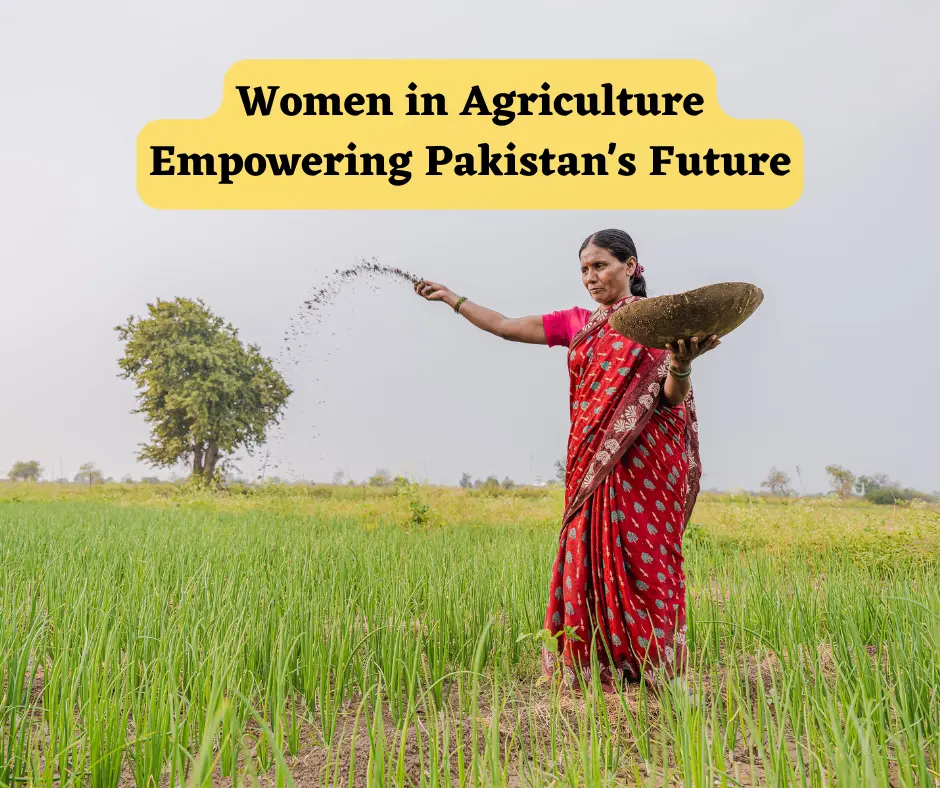Introduction
Role of Women in Agriculture: Agriculture remains the cornerstone of Pakistan’s economy, significantly influencing GDP and employment rates. As we look towards a future driven by sustainable food production and rural development, the role of women in agriculture becomes increasingly vital. Women contribute to the agricultural workforce and play a critical role in ensuring food security and fostering economic growth. Integrating women into the agricultural sector can drive sustainable development and achieve greater productivity and inclusivity.
Importance of Women in Agriculture
Role of Women in Agriculture: Women in agriculture are indispensable for several reasons:
- Economic Impact: Women contribute to over 40% of agricultural labor in Pakistan. Their involvement is crucial for maintaining and boosting productivity.
- Food Security: Women play a key role in food production and preparation, which is essential for the nutritional health of households.
- Rural Development: Women’s economic activities in agriculture support rural economies, leading to improved infrastructure and community development.
Climate Smart Agriculture: Securing Pakistan’s Agricultural Future
Role of Women in Farming
Women undertake a wide range of responsibilities in farming, which include:
- Planting and Harvesting: Women actively sow seeds, manage crops, and harvest produce.
- Livestock Management: They manage dairy animals, poultry, and other livestock, contributing to food security and household income.
- Home Gardening: Many women cultivate home gardens, providing fresh vegetables and fruits for their families and reducing dependency on market purchases.
- Post-Harvest Processing: Women handle tasks such as drying, milling, and packaging, which add value to the raw produce and enhance its marketability.
Despite their extensive involvement, women’s contributions often go unnoticed and undervalued, highlighting the need for greater recognition and support.
Challenges and Opportunities
Women in agriculture face numerous challenges, yet there are significant opportunities for improvement:
Challenges:
- Limited Access to Resources: Women often have restricted access to land, credit, and modern agricultural tools.
- Socio-Cultural Barriers: Gender norms and cultural practices can limit women’s agricultural participation and decision-making.
- Lack of Training: Insufficient access to agricultural training and extension services hampers their ability to adopt modern practices.
Opportunities:
- Education and Training: Targeted training programs can enhance women’s skills and productivity.
- Access to Credit: Microfinance and credit schemes tailored for women can empower them to invest in agricultural enterprises.
- Participation in Cooperatives: Women’s involvement in agricultural cooperatives can improve their access to resources and markets.
Success Stories
Several Pakistani women have achieved remarkable success in agriculture, demonstrating the potential for significant impact:
- Innovative Farming Techniques: Women-led initiatives have introduced new farming methods that increase productivity and sustainability.
- Entrepreneurial Ventures: Stories of women starting agro-based businesses and cooperatives highlight their ability to drive economic growth.
- Community Development: Successful women farmers have contributed to broader community development, including education and health improvements.
These success stories are powerful examples of how empowering women can lead to transformative changes in agriculture.
Empowerment Programs and Initiatives
Various programs are in place to support women in agriculture:
- Government Programs: Initiatives such as the Benazir Income Support Program (BISP) provide financial assistance to women, enabling them to invest in farming.
- NGO Support: Non-governmental organizations offer training, resources, and microcredit schemes specifically designed for women.
- Educational Workshops: Programs focused on agricultural education and skill development help women gain the knowledge to succeed in farming.
These empowerment programs are essential for building women’s capacities and promoting gender equality in agriculture.
Benefits of Women in Agriculture
Empowering women in agriculture yields several benefits:
- Increased Productivity: Women’s involvement enhances agricultural productivity and food security.
- Sustainable Practices: Women contribute to sustainable farming practices by utilizing traditional knowledge and adapting to local conditions.
- Economic Growth: Women’s participation boosts rural economies and improves household incomes, leading to better living standards.
Uses and Applications
Women’s contributions to agriculture extend to various uses and applications:
- Traditional Knowledge: Women’s understanding of traditional farming methods and local ecosystems supports sustainable practices.
- Value Addition: Food processing and marketing involvement creates economic opportunities and strengthens rural markets.
- Community Resilience: Women’s roles in agriculture help build resilient communities capable of adapting to economic and environmental changes.
Problems and Solutions
Despite their contributions, women in agriculture face persistent problems:
- Limited Land Access: Women often need access to land ownership, which restricts their ability to invest in and benefit from agricultural activities.
- Credit Constraints: Difficulty in obtaining credit limits women’s capacity to scale up their agricultural enterprises.
Solutions:
- Land Reforms: Implementing policies that promote land ownership and tenure security for women can address this issue.
- Microfinance Programs: Expanding access to microfinance and credit for women can enable them to invest in and grow their agricultural activities.
- Training and Extension Services: Targeted training and extension services can help women overcome technical and managerial challenges.
Conclusion
In conclusion, women in agriculture are essential to the future of Pakistan’s agricultural sector. We can empower women to drive sustainable agricultural growth and development by addressing their challenges and leveraging available opportunities. Supporting women through education, resources, and recognition will improve their livelihoods and ensure a more inclusive and prosperous agricultural sector for Pakistan.
